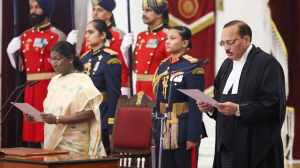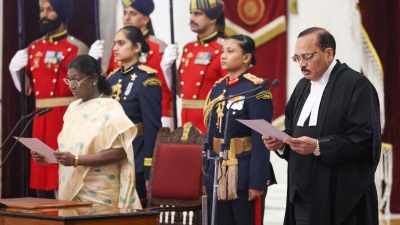Tripura Left Front condemns minority attacks in Bangladesh, calls for immediate action amid rising tensions
Former Tripura chief minister Manik Sarkar criticized the interim government led by Md. Yunus for failing to protect minorities, despite its peace-oriented speeches at the United Nations.
 A series of protests recently rocked Agartala, with demonstrators condemning the violence against Hindus, Buddhists, and other minorities in Bangladesh, particularly in the Chittagong Hill Tracts. (File)
A series of protests recently rocked Agartala, with demonstrators condemning the violence against Hindus, Buddhists, and other minorities in Bangladesh, particularly in the Chittagong Hill Tracts. (File)Amidst growing protests against atrocities on minorities in Bangladesh, the Tripura Left Front held a major rally on Saturday, condemning the alleged systemic attacks on minority communities under the incumbent Chief Advisor Md. Yunus-led interim government. The rally called for immediate and strict action to end the violence and ensure the safety and security of these communities.
Manik Sarkar Addresses the Rally
During the rally in Agartala, which took place amidst heavy rain, former Chief Minister, CPIM politburo member, and party veteran Manik Sarkar expressed concern over the situation in Bangladesh.
He stated, “There is a systematic attack on religious minorities in Bangladesh, even if not everywhere. We condemn these attacks and demand the safety and security of minorities. Democracy can only be said to exist when minorities live with equal rights and can practice their religion freely. The ongoing incidents in Bangladesh need serious deliberation.”
Sarkar Reflects on Anti-Quota Movement
Sarkar also discussed the long-standing movement against the erstwhile Sheikh Hasina-led Awami League government, which led to her fleeing the country. He reflected on how the protests were initially spearheaded by student agitators opposing the massive reservation quotas provided to the relatives of liberation warriors.
Endorsing the anti-quota movement that led to Hasina’s downfall, Sarkar said, “The Bangladesh government had long provided reservation benefits in government jobs to the relatives of 1971 Liberation warriors. As the economic situation worsened, there was a demand to roll back these quotas.”
He further added that instead of initiating dialogue, the Hasina government used state power to suppress the movement, which led to the deaths of over 200 students, most of whom were protesting against the quota system.
Interim Government’s Response Under Scrutiny
Sarkar criticized the interim government led by Md. Yunus for failing to protect minorities, despite its peace-oriented speeches at the United Nations. He pointed out that within just 1.5 months of the anti-quota movement, a series of attacks on minority communities had occurred. He emphasized that most Bangladeshis oppose these attacks and urged the Tripura Left Front to demand protection for minorities in Bangladesh.
Recounting the influx of Chakma refugees into Tripura in the 1980s, Sarkar highlighted the role of the then Left Front government in providing protection and negotiating with the central government to ensure the safe return of refugees to Bangladesh. He drew parallels with the current situation, urging the interim government to take immediate steps to protect minorities and restore peace.
Sarkar also warned about rising tensions in Tripura ahead of Durga Puja, emphasizing the region’s history of communal harmony, where people of all religions have celebrated festivals together. He cautioned against “evil forces” trying to incite communal tensions for narrow political interests and called for vigilance against any form of provocation.
TIPRA Motha’s Solidarity and Demands
Earlier, on September 26, Tripura’s ruling alliance partner, TIPRA Motha, led by Pradyot Kishore Manikya Debbarma, held a major rally at Sabroom. Debbarma urged the Government of India to raise the issue of ongoing assaults on minorities in Bangladesh at the United Nations, with a particular focus on the atrocities faced by tribal communities in the Chittagong Hill Tracts (CHT). He called for Bangladesh to be exposed for its actions at the international level, demanding justice for minorities.
A series of protests recently rocked Agartala, with demonstrators condemning the violence against Hindus, Buddhists, and other minorities in Bangladesh, particularly in the Chittagong Hill Tracts. Protesters called for the Government of India to raise the issue internationally, with some demanding that the CHT be included in Indian territory to ensure the safety of its residents.
Historical Ties Between Tripura and Bangladesh
Tripura shares an 856 km long international border with Bangladesh, parts of which remain unfenced. The state, which once had a tribal-majority population, underwent a major demographic shift due to the influx of refugees during the 1947 Partition and the 1971 Liberation War. Tripura played a crucial role during the nine-month-long Bangladesh Liberation War, sheltering 16 lakh East Pakistani refugees, a number greater than its own population at the time.







